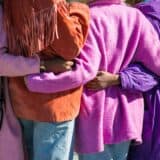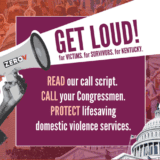Advocate in Your Place of Faith
A culture of support and understanding develops when faith groups and leaders talk about intimate partner abuse.
How is faith related to the survivor experience?
Many survivors of intimate partner abuse experience faith as a distinctive element of their identity and personal lives. While faith can be a source of strength and comfort, it is also complex and, when misused or misinterpreted, can complicate a survivor’s situation.
Are there aspects of your specific faith tradition that could complicate a survivor’s experience?
Consider parts of your holy texts related to intimate relationships, gender roles, and marriage. How can you talk about these texts in a way that makes survivors feel safe in their own faith community?
How does your faith tradition support survivors?
Social support is vital in a survivor’s recovery. Are survivors in your religious community made to feel as though they are expected to choose between safety and their religious community or tradition? Are you familiar with KRS 209A, the Kentucky statute that requires professionals in a variety of sectors, including faith leaders, to provide resources and referrals for suspected victims of domestic violence?
How does your community of faith hold abusers accountable?
How do the clergy and lay leaders in your community hold perpetrators accountable when they are identified by survivors? Does your faith response further isolate the survivor?
Does your faith community demonstrate commitment to ending intimate partner abuse?
Do groups or missions in your faith community provide assistance, such as food or clothing, to local shelters? Do you collaborate with other faith-based organizations or secular programs to address the issue? Including our 24-hour crisis hotline number in your weekly bulletin is an easy first step. That number is 800-544-2022.
What resources specific to faith and domestic violence are available?
Don’t just read this.
Follow this link for more ways to support survivors and end domestic violence.











